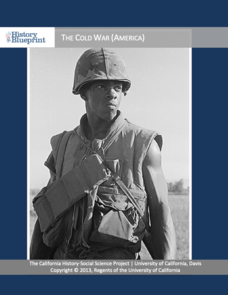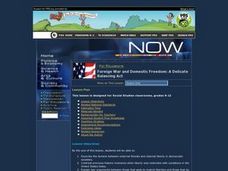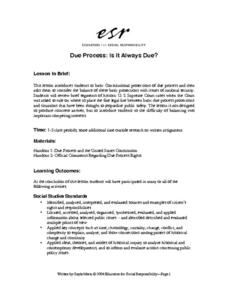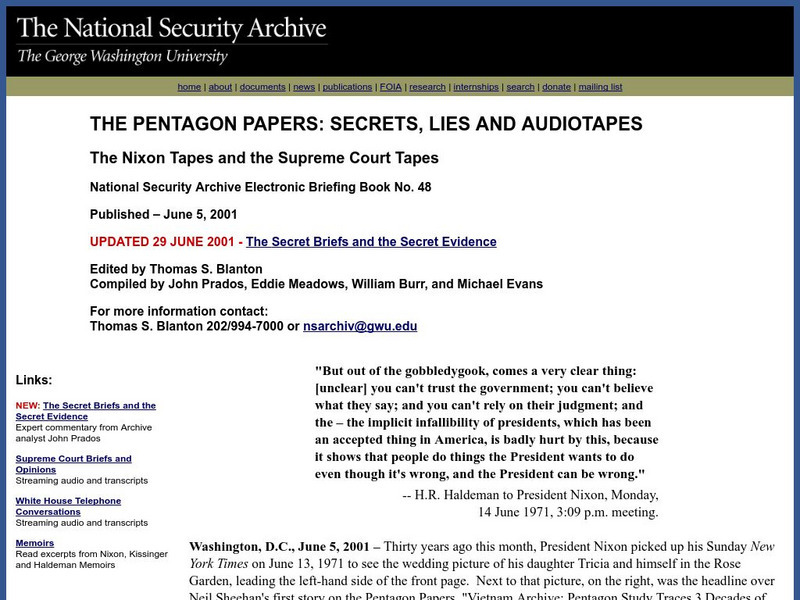Newseum
You Can’t Say That: Right to Know vs. Security Risk
Print or block? That is the question young journalists debate as part of their study of the freedom of the press. Half the class represents the journalists' legal team, and the other half represents the government's legal team. Teams...
Newseum
Free Press Challenges Through History: Analyzing Historical Sources
The debate over the integrity of stories in media is not new. Young journalists analyze historical sources that reveal freedom of the press controversies and draw parallels to challenges freedom of the press faces today.
PBS
Pearl Harbor and the Internment of Japanese Americans during World War II
Balancing national security and civil liberties can be tricky. To appreciate the tension between these two concepts, class members investigate the Japanese attack on the U.S. Naval Base at Pearl Harbor and President Franklin D....
Newseum
'The Press and the Civil Rights Movement' Video Lesson
Scholars watch a video featuring journalists who covered the civil rights movement, then respond to questions on a viewing guide. The video features interviews with participants and original news footage from the 1950s and 1960s. In...
Newseum
‘45 Words' Video Lesson
A short video introduces viewers to the political struggles involved in passing the First Amendment and the many challenges it has faced since its passage. Viewers then discuss how to balance issues of freedom of the press,...
C-SPAN
Foreign Interference in U.S. Elections
With election security looming large for 2020, pupils decide what should be done to protect them from foreign interference. A series of videos, including interviews with national security officials, elected representatives, and experts...
University of California
The Cold War (America)
The Cold War—with its roots in World War II—impacts the world today. Using an extensive curriculum, scholars consider its impact through primary sources, including speeches and propaganda, as well as other skills-enhancing activities. An...
The New York Times
Where to Draw the Line: Balancing Government Surveillance with the Fourth Amendment
The question of how to balance Fourth Amendment Rights with national security concerns becomes critical in an age of planned terrorist attacks, election interference, and fake news. Get young social scientists involved in the debate with...
University of California
Containing Communism Abroad
Learn more about the policy of the United States to contain communism during the Cold War. The fifth installment of an eight-part series looks at primary and secondary materials about a challenging time in history. After analyzing the...
Curated OER
Exploring the Global Security Matrix
Using online and newspaper resources, small groups explore the issue of global security. They answer 13 different questions on three pages that have them consider multiple risks posed by a global security system.
Curated OER
Organizational Strategies for First Year Composition Writers
Identify and analyze deductive reasoning through genuine texts. Compare cultural practices and beliefs about national ID cards. Look for another example of a deductive argument and prepare a brief paragraph analyzing the audience,...
Curated OER
Leaks and Gossip: Examining WikiLeaks Through Political Cartoons
Use political cartoons to spice up a discussion on national security! Two cartoons, one by Normal Rockwell in 1948, the other a parody of Rockwell's by Chuck Asay in 2010, depict the dangers of leaking information. Background information...
Curated OER
Foreign War and Domestic Freedom: A Delicate Balancing Act
Students investigate civil liberties in the U.S. They watch and discuss a PowerPoint presentation, conduct research on an event from a timeline, complete a worksheet, take an ideology quiz, and conduct a debate.
Curated OER
Civil Liberties And National Security
Learners experience profiling first-hand through creation of a Class ID, and daily persecution of a selected group of students. They examine the tension between the concern for national security and for the preservation of civil liberties
Curated OER
Japanese Internment Camps in the US During World War II
Eighth graders analyze the impact of the Japanese/American conflict during World War II on the Japanese American population and evaluate the consequences of government action regarding international conflict. Students demonstrate their...
Curated OER
Due Process: Is It Always Due?
Students explore the basic Constitutional protections of due process and then consider the balance of these basic protections with issues of national security. A variety of segments of U.S. Supreme Court cases are examined in this lesson.
Curated OER
Civil Liberties and National Security
Students identify the civil liberties outlined in the U.S. Bill of Rights and discuss the importance of these liberties in today's society. They research examples of when Congress has taken legislative action to protect national security.
Curated OER
The Right to Know
Students discuss their knowledge of the position of National Security Advisor. They read and discuss a newspaper article about national security and intelligence as it relates to terrorism and the public's right to know.
Curated OER
Internment of Japanese-Americans in Arkansas during WWII
High schoolers identify the location, purpose, and details of the 2 Internment Camps in Arkansas for Japanese-Americans during WWII.
Digital History
Digital History: September 11, 2001
This site has a comprehensive overview of the September 11, 2001 attacks on the U.S., including information on Osama bin Laden's background, the formation of Al Qaeda, the attacks themselves, the US response, civil liberties and national...
Other
Business Executives for National Security
"Business Executives for National Security (BENS) - a national, nonpartisan organization of business leaders who apply the lessons of their successful businesses to making our country safer and more secure." Topics include: What's New,...
Lectric Law Library
'Lectric Law Library: New York Times v. United States
The 1971 leaking of the Pentagon Papers to the New York Times led to a Supreme Court case in which the government took the newspaper to court over publishing classified information about Vietnam War policy.
George Washington University
Nsa: The Pentagon Papers: Secrets, Lies, and Audiotapes
This site offers an extensive history of the 1971 Pentagon Papers case. Features include transcripts of President Nixon's tapes, White House phone conversations, memoirs, and other primary resources.
PBS
Pbs Online News Hour: What Are the Conditions for Victory in Iraq? Lesson
This is a question that we all think about. Explore it with your young scholars and try to figure out what a postmodern victory looks like in Iraq in an age of asymmetrical warefare. (2003)























